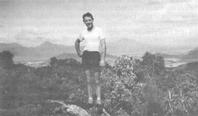


Radio Technical Officers
Foreword
Acknowledgements
Preface
Introduction
Chapter 1: The Early Years
Chapter 2: The Training School
Chapter 3: Equipment Installation Records
Chapter 4: The 'Techs' in Antarctica
Chapter 5: The 'Techs' Tell Their Stories
Trevor Donald Tells It All; Life in the Bureau from 1947 to 1989
Ray Clarke Looks Back
Some Memories from Ralph Bulloch
Peter Copland Works in Meteorological Electronics
Some Titbits from Dave Grainger
A Very Modest Tale from Alf Svensson
Adrian Porter Pulls No Punches
Jack Tait Recalls
Some Stories by Colourful Freddie Soutter
Some Snippets from Noel Barrett
Stephen CourbÍt Has His Penny Wworth
And a Flyspeck or Two from Lenny Dawson
Some Interesting Reminiscences from Jannes Keuken
Brief Stories from Phil Black
From Gloria West, Wife of the Late Bob West
The Life and Bureau Times of Graham Linnett
Tales Out of School from Bill Hite
Peter Copland on Cyclone Tracy
Peter Broughton Tells the Story of Maralinga
Appendix 1: 'Techs' Roll Call
Appendix 2: Trainee Intakes
Appendix 3: 'Techs' Who Have Served in the Antarctic Region
Appendix 4: Summary of Major Installation Projects
Appendix 5: Summary of Major Equipment Variously Installed at Sites and Maintained by Radio Technical Officers
Index
Search
Help
Contact us

Ray Clarke Looks Back
I joined the Bureau in early 1961 having come from a technical background of nine years with the Army Signals Corps and six years with AWA in Melbourne.Observer Radio Course No 13 comprised colourful characters who made their name in one way or another. There was Neil Davies, always sharp as a tack, J. J. Byrne, always good for a dry joke or two and a cold ale or two, pleasant old Joe Grey from South Australia, Trevor Donald seemingly on top of it all, happy go lucky Jannes Keuken and, lastly, there was me, 'Clarkie'.
Our instructor? Who else but 'Mac' (John MacDermott), the doyen of the would be 'met techs'. Somehow or other we all passed the course. I can't remember who topped the class but I don't think it was me. I got the feeling 'Mac' frowned on my, to him, unorthodox methods and lateral thinking. Anyway, off we went in late October 1961 to all corners of the Bureau's network never to see each other for some years although our paths later crossed as they eventually will do in the Bureau's family.
My first posting was to Lae in November; 34°C with 85 percent humidity and I'd just left a cold 14°C Melbourne. I wanted to get back on the plane and avoid this stifling oven but I stayed and enjoyed the lifestyle which I guess at that time could be called a 'white man's Utopia'. Arthur W. Douglas (the OIC) was a legend for his hospitality, and I can recall Frank Ella, Les Onley and other observing staff who quickly showed me the ropes. I learnt at least two things in my short career at Lae—how to make quick high pressure hydrogen in the tropics without blowing yourself up and how to finish the radiosonde calculations in record time. I was sorry to eventually leave Lae, and to have my last glimpse of the Tenya Maru.
After a short stint at Cloncurry looking after a clapped out 277F radar, an unhappy inheritance from previous years, I relieved Freddie Soutter in Cairns looking after the WF1 radar at the airport and the SNW51 radar on Saddle Mountain at Kuranda. Freddie gave me a two hour briefing. Then he was off. It wasn't his fault; just the normal handover/takeover problem. Kuranda was a great place in 1962; peaceful, magnificent scenery and full of fair dinkum Aussie characters.
I look back with many happy memories of Cairns and Kuranda, even the countless snakes that frequented the mountain all the way along the access track. I recall breaking the office broom (the nearest weapon) on a black-headed python which slithered into the office area at Kuranda. Another time, at Cairns Airport, I had a nasty confrontation with a red-bellied swamp black, a good 1.5 metres long, who shared the same toilet as me. I didn't have a clue he was there until I flushed the toilet; he must have been reading the Cairns Post with me all the time. When I recovered my composure I made a desperate attempt to stone it to death, but it escaped. I broke the toilet seat and George Heath (our popular OIC) delivered me a lecture, tongue in cheek, about taking greater care of Commonwealth property. In September 1962 I assisted Reg Stout and the installation team to put in the Cossor radar. It is here that I probably caught the installation bug.

People in Bright Sparcs - Clarke, Raymond W.; Stout, Reginald William (Reg)
 |
Bureau of Meteorology |  |
© Online Edition Australian Science and Technology Heritage Centre and Bureau of Meteorology 2001
Published by Australian Science and Technology Heritage Centre, using the Web Academic Resource Publisher
http://www.austehc.unimelb.edu.au/fam/1196.html